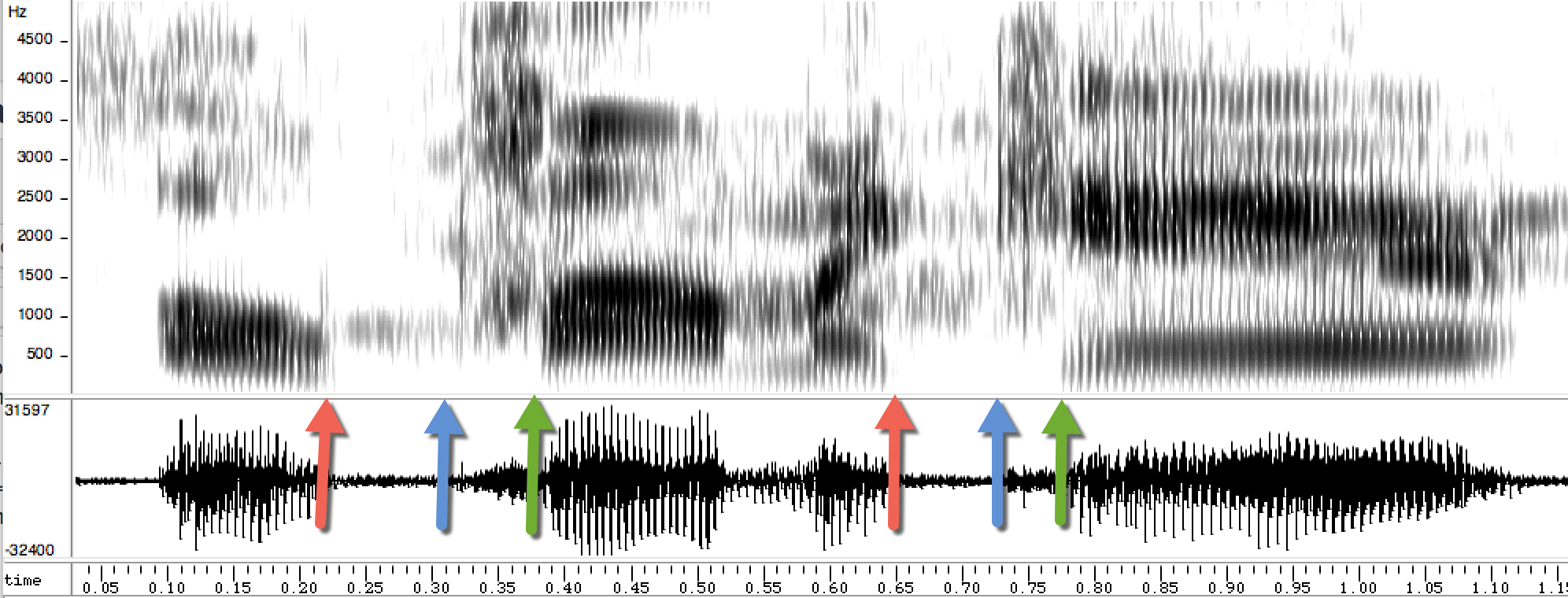Opamacare
« previous post | next post »
One of the most widely noted aspects of last night's SOTU address was the president's pronunciation of "Obamacare" as if it were spelled "Opamacare":
Anyone can hear this emphatic voiceless plosive pronunciation of the /b/, but let's look at the numbers.
Here's a spectrogram and waveform of the crucial word, pronounced in broad IPA as [o'pɐ.məˌkeɹ], in which we see a 100-msec closure and 87-msec aspiration duration for the [p]:
In comparison, Mr. Trump performed an 81-msec closure duration and a 51-msec aspiration duration for the [k].
What does this mean? I have no idea. Phono-semantic leakage from "Oprah"? Rhetorical emphasis gone astray?

MattF said,
January 31, 2018 @ 1:16 pm
Maybe it was a typographical error in the teleprompter text.
Dagwood said,
January 31, 2018 @ 2:27 pm
I noticed Trump's long-O pronunciation of "scourge" — like "skoarj", if you will — reminiscent of the way I've heard northeasterners (in NYC & VT, at least) pronounce tournament and Missouri: the "-our-" is given a long O vowel sound.
However, since "scourge" isn't a common word, I don't recall hearing other northeasterners say it. So I wonder if Trump's pronunciation thereof was regional or accidental.
Rubrick said,
January 31, 2018 @ 5:55 pm
I think it's fairly obvious that excessive use of plosives correlates with the speaker being a blowhard, much as excessive use of "I" correlates with narcissism ( regardless of whether the excess actually occurred).
Levantine said,
January 31, 2018 @ 7:51 pm
I noticed something similar when Trump was announcing the tax cuts back in November. Upon claiming the cuts wouldn't benefit people of his wealth, he said, "Believe me, belief . . . This is not good for me": https://www.youtube.com/watch?v=Raw_kaqW8_E#t=01m45s. It seems he intended to repeat the phrase "believe me" but ended up devoicing the V and dropping the "me".
Jason said,
January 31, 2018 @ 7:55 pm
The effects of late neurological syphilis on speech production …
AG said,
January 31, 2018 @ 8:07 pm
Is there any chance "P" is easier to say than "B" when your dentures are sloshing around in your mouth?
https://www.youtube.com/watch?v=lmk6oC2CuT0
Toby said,
January 31, 2018 @ 10:53 pm
Are any comments on this going to be serious or just so much liberal shouting in the wind?
Levantine said,
February 1, 2018 @ 12:58 am
Toby, of the six comments before yours, three (mine included) are apolitical.
Pflaumbaum said,
February 1, 2018 @ 5:12 am
Could it be the influence of the /p/ in the preceding “repeal”? He hits that word quite hard.
Oha Nueba said,
February 2, 2018 @ 4:53 pm
Hello, linguist folk of the interwebs! Well, I think this goes back to the fact that English phonology does not truly have a voice distinction at all.
Andrew Usher said,
February 3, 2018 @ 7:17 am
That is a joke – the voicing distinction is English is very much clear-cut, even if some other Germanic languages have trouble with it.
What Trump said here is exactly how a /p/ would be pronounced in this position, and never a /b/. I do not know how he blundered so, but it obviously wasn't on purpose.
k_over_hbarc at yahoo.com
Pflaumbaum said,
February 3, 2018 @ 6:46 pm
Well, the distinction is clear (except sometimes word-finally), but I don’t think it’s correct to call it a voicing distinction. For instance the /t/ and /d/ distinction, depending on position, is marked by a complex matrix of voicing, aspiration, frication, glottalisation, lenition and quality of the preceding vowel.